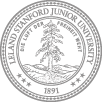Research Policy Handbook
Academic Freedom (RPH 2.3)
Current version: April 16, 1998
Summary:
Assures the fullest protection of freedom of inquiry, thought, expression, publication and peaceable assembly at Stanford University.
This Statement on Academic Freedom was adopted by the Senate of the Academic Council on April 18, 1974, and approved by the Board of Trustees September 10, 1974 upon the understanding that, as stated by the President of the University in his written recommendation to the Board, "The University's processes of search and evaluation are designed to produce the best possible persons for membership on the faculty. The Statement on Academic Freedom would in no way change that goal or the practices used to reach it."
Conforming to 1989 and 1990 actions of the Senate of the Academic Council on the recommendations of the Second Committee on the Professoriate, "faculty" refers to titles included in the "professoriate," defined (in the Stanford University Faculty Handbook) as: the tenure-line faculty; assistant professors (Subject to Ph.D.); the non-tenure line faculty; Senior Fellows and Center Fellows at specified policy centers and institutes; and the Medical Center Line faculty. The Statement was amended by the Senate of the Academic Council on April 16, 1998.
Preamble
Stanford University's central functions of teaching, learning, research, and scholarship depend upon an atmosphere in which freedom of inquiry, thought, expression, publication and peaceable assembly are given the fullest protection. Expression of the widest range of viewpoints should be encouraged, free from institutional orthodoxy and from internal or external coercion. Further, the holding of appointments at Stanford University should in no way affect the faculty members' rights assured by the Constitution of the United States. In furtherance of these general principles:
I.
Decisions concerning
- the search for, and appointment and promotion of, faculty;
- the assignment of teaching and other primarily academic responsibilities;
- the support and sponsorship of scholarly research; and
- any other granting or withholding of benefits or imposition of burdens
shall be made without regard to a person's political, social, or other views not directly related to academic values or to the assumption of academic responsibilities; without regard to the conduct of a person holding an appointment at Stanford unless such conduct is directly related to academic values or to the assumption of academic responsibilities or is determined, in a proceeding pursuant to the Statement on Faculty Discipline, to come within the provisions of Section I of that Statement; and without regard to an individual's race, ethnic origin, sex or religion. Nothing in the foregoing shall be deemed to affect the University's application of affirmative action policies in its faculty search procedures.
II.
The grievance procedures outlined in Section III are designed to assure that decisions by faculty members and administrators comply with the standards of academic freedom established in Section I. These procedures are internal to the University and are aimed at preserving confidentiality and academic integrity while protecting the rights of individual faculty members. The provisions of Section I do not create contractual rights subject to review by agencies outside the University. The procedures outlined in Section III, however, constitute the administrative remedies for faculty grievances covered by parallel rights established under applicable federal and state laws (such as Civil Rights Acts).
III.
The following procedures shall apply to all grievances (defined as in the Statement on Faculty Grievance Procedures) arising under this Statement on Academic Freedom:
- The rights herein conferred shall be enforceable only by a person who is directly aggrieved and who holds a faculty (as defined above) position; no other person or persons shall have standing to complain.
- If any faculty member feels aggrieved by a decision that he or she believes to be in violation of this Statement, he or she may file a grievance pursuant to the Statement on Faculty Grievance Procedures and its attendant standing rules.
- For grievances brought in whole or in part for alleged violation of the Statement on Academic Freedom, the rules and procedures of the Statement on Faculty Grievance Procedures shall be modified as follows:
- For a grievance not arising out of a negative decision on appointment, reappointment or promotion (and therefore for which consideration by the Advisory Board would otherwise be unavailable), the grievance and appeal structure shall nonetheless include the Advisory Board as to that portion of the grievance raising an alleged violation of the Statement on Academic Freedom.
- To the extent that a grievance or appeal does not involve a violation of Section I.1 of this Statement (that is, relating to the search for, and appointment and promotion of, faculty), the Advisory Board may, at its option, refer the grievance to any faculty member or committee of faculty members as it deems appropriate, which faculty member or committee of faculty members shall consider the matter and make recommendations to the President directly.
- For each grievance or appeal raising an alleged violation of the Statement on Academic Freedom, the Standards for Review under Section V of the Statement on Faculty Grievance Procedures shall be expanded to include the consideration: "Did the decision give weight to one or more of the factors ruled out of proper consideration by Section I of the Statement on Academic Freedom?"
Back to top


